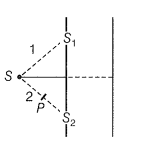The figure shows a two-slit arrangement with a source that emits unpolarised light. P is a polariser with an axis whose direction is not given. lf is the intensity of the principal maxima when no polarizer is present, calculated in the case, the intensity of the principal maxima as well as of the first minima.

Hint: The intensity of the maxima or minima depends on the intensities of the individual interfering waves.
Step 1: Find the resultant amplitude without polariser.
A Resultant amplitude = A parallel (A)+ A perpendicular
Without P:
where are the amplitudes of either of the beam in perpendicular and parallel polarisations.
Step 2: Find the resultant intensity without polariser.
Step 3: Find the resultant intensity with polariser.
With P:
Assume is blocked
Given =lntensity without polariser at principal maxima.
lntensity at principal maxima with polariser =
intensity at first minima with polariser =

© 2026 GoodEd Technologies Pvt. Ltd.